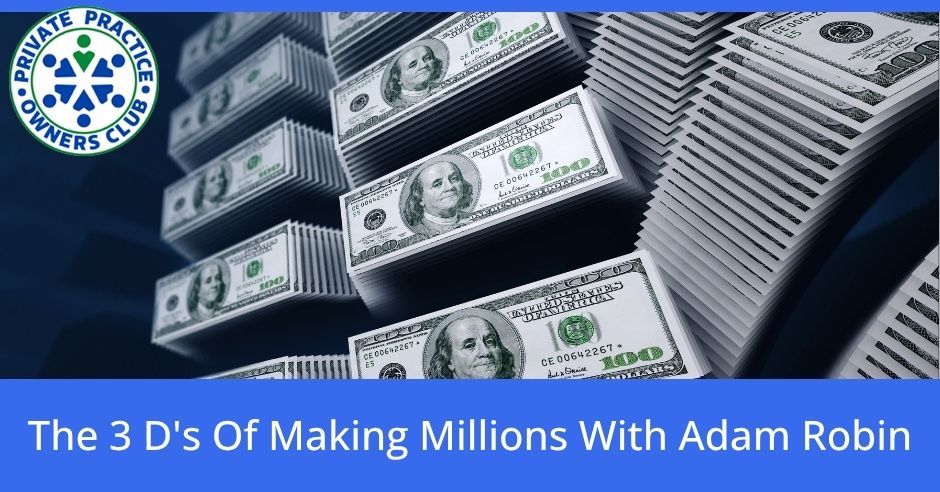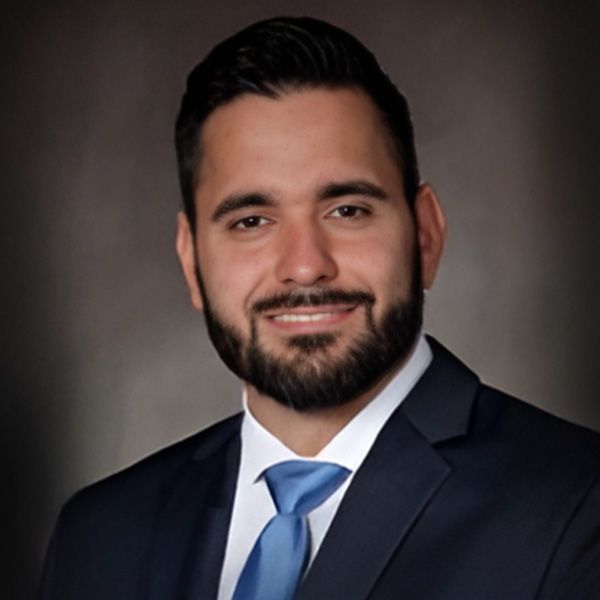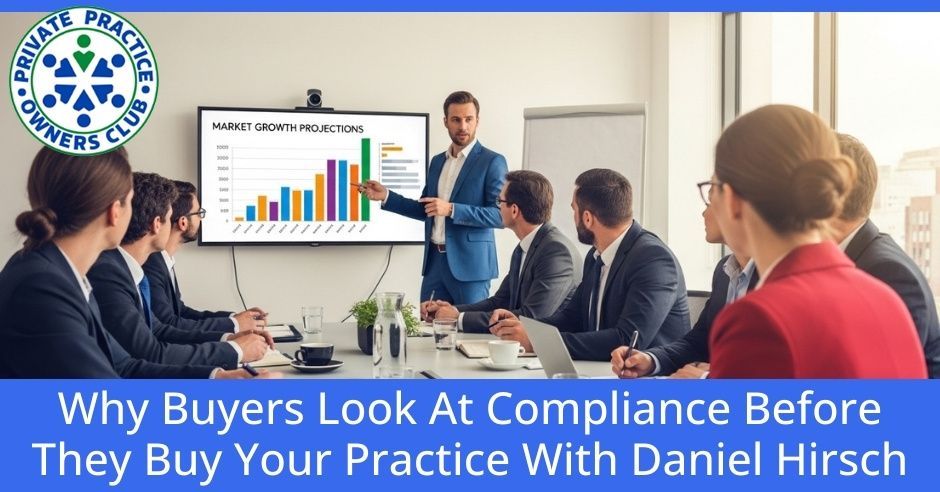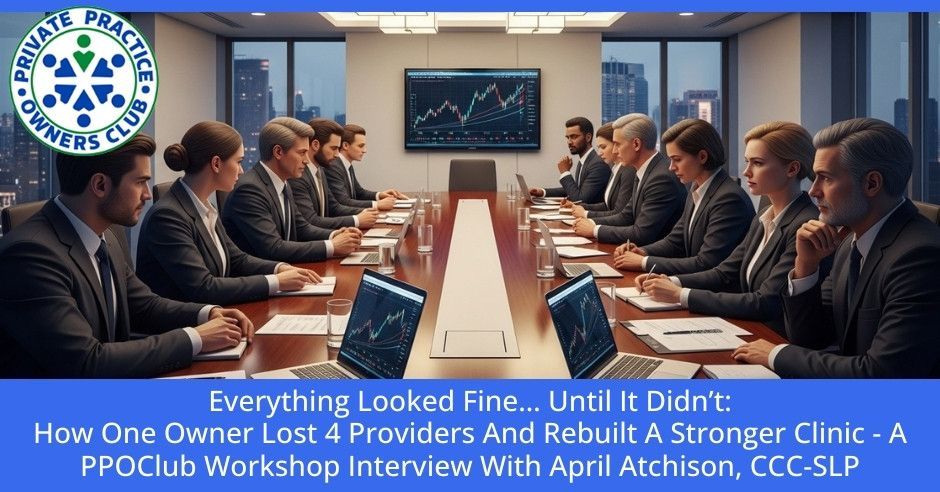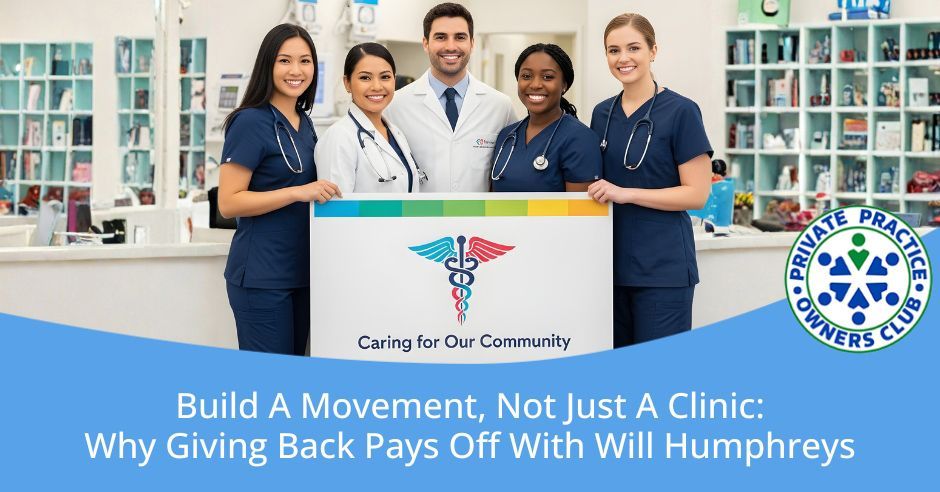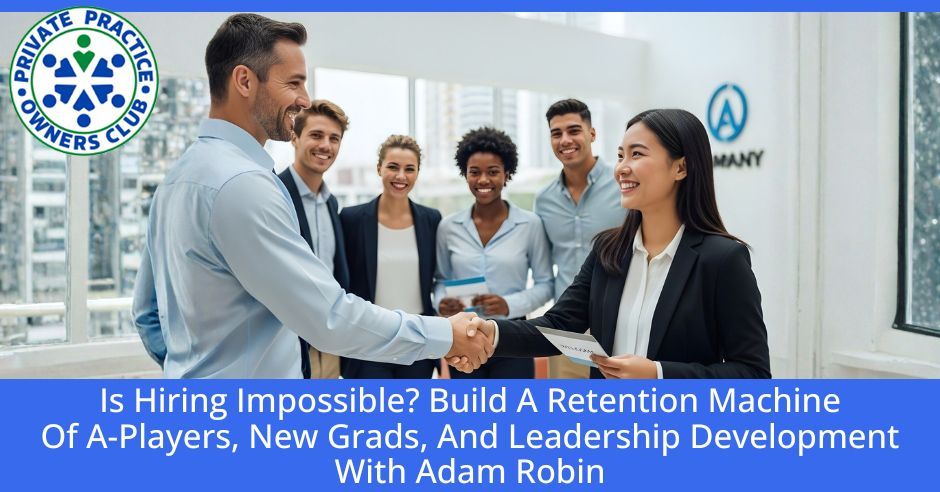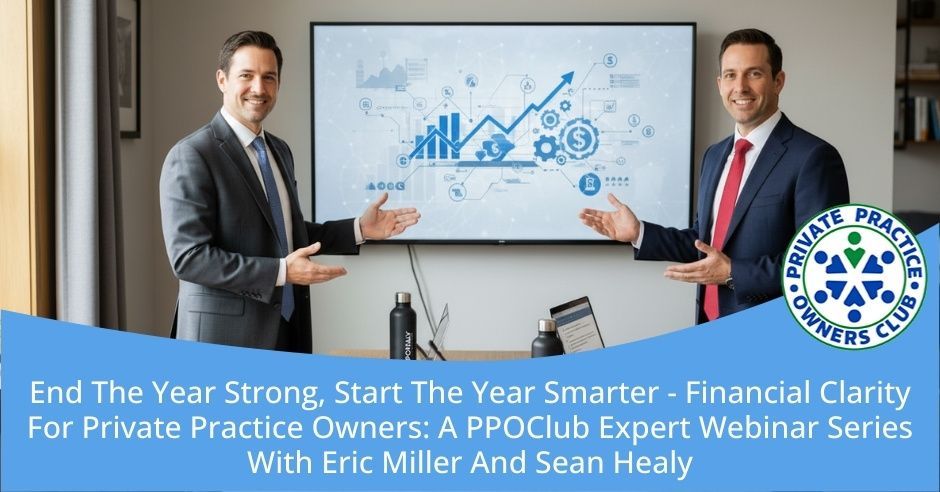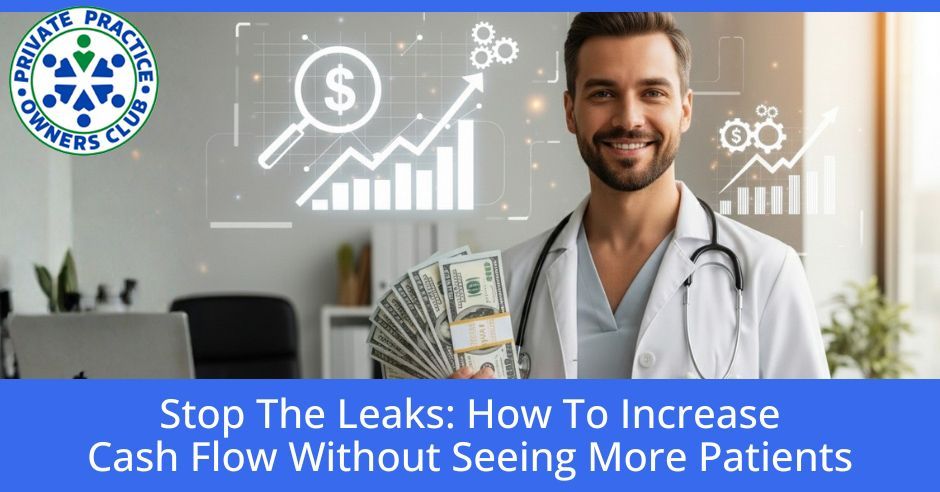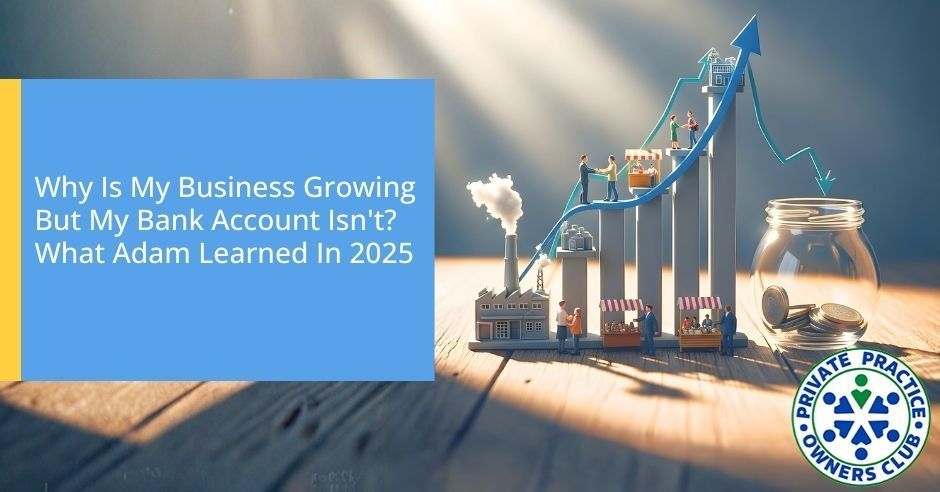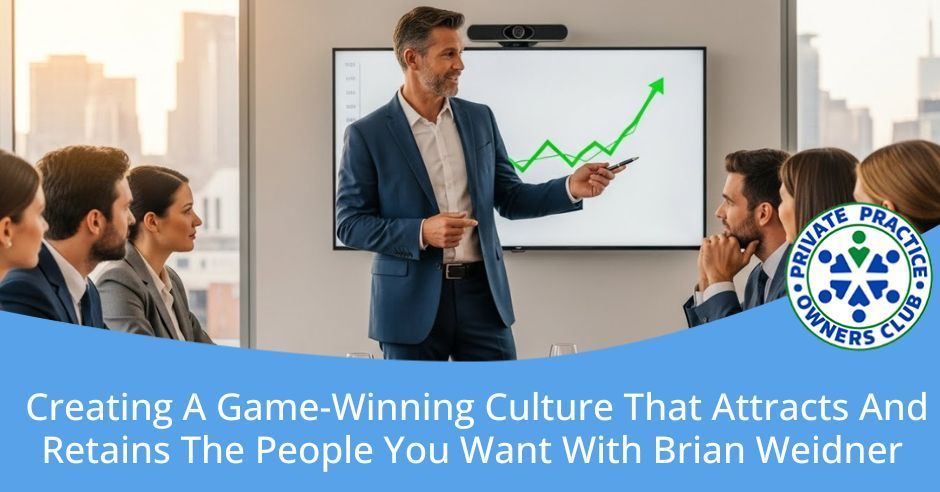𝗬𝗼𝘂 𝗱𝗼𝗻’𝘁 𝗲𝗮𝗿𝗻 𝗺𝗶𝗹𝗹𝗶𝗼𝗻𝘀 𝗯𝘆 𝗮𝗰𝗰𝗶𝗱𝗲𝗻𝘁. You decide to.
In this episode, you’re going to learn exactly how top-performing Private Practice owners flip the switch and do it.
Tune in and listen as Nathan Shields and
Adam Robin unpack the mindset and mechanics behind scaling to 7-figures in private practice. Adam drops the exact internal shifts and strategic moves that helped him multiply his income, expand to multiple clinics, and ultimately, build a Practice that works for him – not the other way around.
This episode is for every private practice owner who’s tired of spinning their wheels, who knows they’re capable of more, and who’s ready to break through the revenue ceiling that’s been holding them back.
You’ll learn the 𝗧𝗛𝗥𝗘𝗘 𝗗𝘀 that separate the million-dollar owners from the ones barely scraping by – and more importantly, how to start applying them immediately.
Episode Highlights:
● You will never out-earn your self-worth – and why your income is capped by what you believe you deserve.
● Why acting like a million-dollar clinic before you’re making millions is the key to actually getting there.
● The bold decision-making habits that elite practice owners live by.
● How designing your Private Practice on purpose changes everything.
● The one thing you must demand if you want long-term profitability and freedom.
This isn’t theory – it’s real talk from two practice owners who’ve done it. If you’re struggling to collect what you’re worth, working too many hours, or feeling stuck at the same revenue month after month, hit play now.
This episode might be the permission – and the strategy – you’ve been waiting for.
Listen now and claim your spot among the top 1%.
Scale smarter:
● 𝗩𝗶𝘀𝗶𝘁 𝗼𝘂𝗿 𝗟𝗶𝗻𝗸𝘁𝗿𝗲𝗲 for our Coaching Services, Free KPI Dashboard, Facebook Group, and Annual Strategic Planning Services:
https://go.ppoclub.com/linktree-podcasts
● Love the show? Subscribe, rate, review, and share!
https://ppoclub.com
---
The 3 D's Of Making Millions With Adam Robin
Hello and welcome to the Private Practice Owners Club. Nathan Shields here with my partner,
Adam Robin. How are you doing?
I'm doing good. I'm fired up to be here, and excited.
I'm excited, too. You've got a surprise topic for me. Before we pushed record, Adam said, “I'm not going to tell you what's coming,” so he gets some authentic reactions from me. It has all to do with making millions. Some people are okay with that. They would like to do that once in a while. It should get some attention. Hopefully, it does. I'm positive there's going to be a ton of value and a lot of implementable action items that you can bring to your business, so let's get into it. Where do you want to start?
Unlocking Millions: Mindset & The 3 D's Of Practice Growth
I'll start with a story. I've been trying to be a good business owner and make better content for people who are watching my stuff. I'm getting to that stage where I can't wing it anymore. I have to prepare a little bit and design what I want to talk about. This was a content day where I sat down. I asked myself a question. It's like, “Adam, how do you make money?” I started journaling on my thoughts. I wrote down three powerful points on how I've made my money. This probably applies to a lot of people. They all start with D, so I came up with the three D's to millions. I wanted to share this framework. There's going to be some implementable things that you can take away, but it's going to be a lot about your mindset and the way that you're thinking about money. I'm excited to get into it.
It's always interesting to me that you hear from people who have made a lot of money. They're like, “I had to figure out this, that, and the other thing.” It doesn't seem to come that easily, but the one thing I have noticed is that they start with a mindset, a lot of the time. There are some things to do. There are some technical components, some things, and some actions you have to take, but what sticks out to me as I listen to them is that you only make as much money as your mind is willing to let you make. You're limited in how much you make based on your thinking.
One thought that hit me hard was someone saying, “If you want a million-dollar business, you don't wait until you make $1 million to act like a million-dollar business.” You start acting like a million-dollar business from day one. You make million-dollar business decisions and establish a team that will get you to $1 million, and they will get you to $1 million. If you're not making million-dollar decisions before $1 million, then it's going to be hard to get there.
It's impossible to get there.
That was helpful to me. It is also the mindset of the best business owners we know. If I were to compare my actions with the best business owners in the world, would I be making the same decisions that they are? They've got an expert at saying no to many things, saying yes, investing, going out on a limb, getting out a little bit into the uncomfortable zones, and making decisions quickly. They can pivot if needed, but also, “Let's trail a path. Let's go.” The mindset of many smaller business owners is, “Let me figure out the data.”
“Let me run it by the wife.”
“I'm heading hem and haw. Maybe not right now is the right time. Maybe when XYZ happens and 123 occurs, then I'll be in a better position.” The best business owners we know don't hem and haw like that. What minimum data they have, they move.
The best clients that we work with, the elite-level clients that are in our program, have an identity. They want to be great, so they act great. They do what great people do. Part of that is making bold, scary decisions and recognizing that sometimes you're out on the edge, and it requires a little bit of a jump to get to the other side. They run and jump because that's what great entrepreneurs do. They do the scary thing.
Hit it off. What's the first D?
Deserve It: The First D To Financial Freedom
I want to take you back in time. When did you open your clinic?
2002.
It might have been later in the year. You're probably about a year into practice, and you have a front desk person. You've got to collect some over-the-counter money. You were like, “If I collect the money, then the patients are going to leave.” There was that fear. Remember that silly thing you used to tell yourself? We all go through that. It's because we don't recognize that we deserve it. The first D is that you must deserve it. You must convince yourself that you deserve it, that you are worthy of it.
One of my favorite taglines is that you will never outearn your self-worth. Whether you're collecting over-the-counter money, demanding higher reimbursement rates from your insurance companies, negotiating tough salaries with your team, and having to negotiate and leave a little meat on the bone for the business, if you're not sold that you deserve profitability, you will never be able to become the person that asks for it and demands it.
Do you think that's something like a personality trait of the industry? There are a lot of us in the industry who have a hard time demanding money for the services we are providing, and also being worthy of it. We do tend to take a submissive role to the other healthcare providers in the industry. We don't express our worthiness as a collective industry to the other healthcare practitioners, to the hospitals, and the insurance companies. It's almost like we're willing to take what we get and minimize the impact that we have as a collective.
You only make as much money as your mind is willing to let you make.
There are not a lot of voices that are saying no. I honestly don't know what the APTA is doing for us in that regard. They're fighting against the 3% cuts on Medicare every year, but outside of that, I don't know if there's a voice out there that's saying, “We need to do better as an industry because we deserve better.” I wonder if that's a personality trait that's been taken on by the therapy industry at large.
We're all bitten by that to some capacity.
There could be a little bit of imposter syndrome.
You're talking to somebody who dealt with that. We all deal with that self-worth. You deserve it. Stop asking permission to be great. Stop asking permission to go after what you want. You don't have to explain it to anyone. I don't owe you or anybody an explanation. The reason why I want to be profitable is that I want it. That's enough. You're not being greedy. You're still going to marry that self-worth or that feeling of deserving it with high levels of support and empathy, serving people more than they've ever been served, but you're also going to get paid at a high level for it.
For those who are reading, this is real life. This isn't like, “Adam is being a weird monk guru.” This is real-life stuff. If you work on your self-worth, you will make more money. I promise you. It becomes less about what you do and the strategies that you implement. It becomes more about who you're becoming. I can't stress that enough. Every time I work on myself, I make more money. Every time I invest in a coach, invest in leadership, invest in my skills, and ask Nathan to challenge me and my limiting beliefs, I always level up, and I always make more money. I hire more people, start more businesses, and make more money every time. I want to stop and remind you of that. This is what I do.
I wake up every morning, and I have a mantra. I remind myself that I am worthy. I'm worthy. I matter. I deserve it. I'm a powerful leader, and I make a big impact in the lives of others. I know that I can transform others' lives. I'm worthy, and I remind myself of that daily. Practicing some type of mantra with yourself every day is powerful. Aside from that, it is surrounding yourself with some people who can speak possibility into you, who can be like, “Nathan, you're incredible. You're awesome. I see more in you.” They can pull you out and help you see more for yourself. It is another valuable habit.
Number three is self-care, taking care of yourself. Stop running yourself into the ground. If you love yourself, act like you love yourself. You wouldn't treat somebody else the way you treat yourself. Take care of yourself. Get some sleep. Drink some water. Take a lunch. Lastly, it is hiring some type of coach or mentor and investing in educating yourself around some leadership principles. If you do those things, your self-worth will go through the roof. You'll start to attract money to you.
When you look at your organization, you're sitting at the top of the pyramid. Maybe you're treating patients and scrubbing toilets on the weekends and stuff like that, but you are the top of the pyramid if it is your business. I like to question some owners. Who's holding you accountable? It is your spouse, maybe, but they don't know the intricacies of the business or business ownership typically. Who's holding you accountable to make sure the most important things stay the most important and that you're doing those items that are of the utmost priority to achieve the goals you want to achieve?
There are a few owners who have the self-motivation to get stuff done, move, blaze a path, and go. I'd say that's the rare minority, frankly. A majority of us need someone to hold us accountable, give us guidance, feedback, and be our Obi-Wan to us as the Luke Skywalker of our story. Someone with some wisdom, guidance, and support can be there to make sure we're on the right track and also push us a little bit. They see more in us. They expect more out of us. That can be super valuable, and that will accelerate your growth.
You will never outearn your self-worth.
I get on coaching calls and sales calls from owners who are wrestling with decisions. It's like, “I'm thinking about this, but I don't want to.” They almost want to talk themselves out of it. A lot of times, it's like, “What do you want?” They'll say it, and I'll be like, “Why don't you do that?” They're like, “I guess I needed somebody to give me permission to do it.”
This whole time, you've been telling yourself that you have to ask for permission to get what you want. For whatever reason, you're telling yourself, “I don't deserve it,” or “I need to ask permission.” Why don't you do what you want to do and don't care about what anybody else thinks? If you can win that game, you're going to instantly put yourself into an elite category. Stop asking for permission. Say what you want to do, and write it down. Don't even think about it. Just do it.
I feel bad for owners that I've talked to who have shared with me circumstances in which they have a member of their team who doesn't align with their values. They hate going to work because they might have to interact with that person. They're toxic, and they bring everybody else down. I'm talking to the owner. I'm like, “Why are you putting up with it? Did you start a business so that you'd have to deal with it?”
“You can make the decision to let them go, live, and work in an environment that you enjoy going to. You are the person who can create your own story and fulfill that dream. What's keeping you from firing these people?” There are fears, and they're going to throw out all the excuses. Sometimes, you open it up to, “What would happen if they weren't here tomorrow?” They typically go, “That'd be great.” Why don't you go and do that?
If you, as the owner, can get in the habit of doing what you want more often and more quickly, you'll instantly elevate your performance in your business. You will instantly make way more money. Double the amount of those decisions quicker, and stop asking questions. Here's the kicker. You will never be able to ask for what you don't feel like you deserve.
If I don't feel like I'm worth $20 a visit, how am I going to ask this patient for $20 a visit? If I don't feel like I deserve $100 a visit because they haven't had a deductible, what am I going to do? “I'll make a deal with you. Maybe I'll see you once a week.” That's the thing. I deserve it because I'm going to transform your life. I have to be sold on that. I have to believe it, or at least pretend like I do, so that I can become the person. Through that discomfort, you build confidence with yourself and with who you are. You start to transform people's lives.
Not to belabor the point and stay on this topic because we want to talk about the other parts, but as you're saying that, I'm thinking then whoever it is, whatever our reimbursement rate is, is reflective of what we think we deserve more so than what the insurances are willing to pay us.
You can never outearn your self-worth.
If my average reimbursement rate is $83 a visit, and I don't like it, it sucks, and my profit margins are slim, what are you doing to deserve $83 a visit? What are you willing to reason? What are you willing to accept? What are you doing such that your reimbursements are $83? If you believe you deserve more, then your actions would start falling in line with a higher reimbursement rate.
You will be that person.
You will become a clinic that can collect $102 a visit. Maybe it takes a little bit of guidance on how to do it, but when people take control and say, “We deserve more,” interestingly, either by dropping low-paying insurances, negotiating with insurance companies, doing better at collecting at the front desk, doing better with their collections, doing better with their charges, or optimizing charges of the providers, reimbursement rates go up.
Your tolerance to underperformance on the team, not collecting over the counter, paying more people more than the math equation allows, all of that goes away because you deserve that. You deserve profitability. Your team deserves profitability, and you're not going to compromise that.
Design It: Math And Strategy For Practice Growth
Assuming you deserve it, that takes practice. I am not going to wake up tomorrow and be like, “Now, I deserve it.” It's going to take practice. Your routine is a mantra, reminders, some type of group of entrepreneurs you're plugged into to challenge you, and some type of coach or mentor to guide you. That's the solution to that.
Focus on your self-worth. Number two is you must design it. That means it's on purpose. It's not by accident. It's created. I'm playing offense on this thing. My strategy isn't, “Just treat patients and see what's left over.” That's not the strategy. That's defense. That's like, “I'll just throw cards up in the air, and we'll see what happens.” I'm being the designer, the architect of the thing. Now that I deserve it, I can create it on paper. That must be on purpose. It must be objective. Making money is a math problem. That's all it is.
Patients come in, there's a little transaction over the counter, and then there's a transaction when you're delivering care based on the CPT codes that you use. There's a transaction with you in the billing department. Those are all pluses and minuses. You want to design as many pluses as you possibly can. Here's a trick. If you want to make money in your practice, you've got to deliver care cheaper than what you're going to get reimbursed. That's the trick. If you're going to make $100 a visit, you can only spend $60 a visit. That's the trick.
If you do that, you'll make money. I like to think of a math formula. I like to think 5 plus 5 equals 10. What else equals ten? 6 plus 4 equals 10, 7 plus 3 equals 10, and 2 plus 8 equals 10. There are a lot of ways you can get to 10, meaning there are a lot of models that you can create. There are a lot of ways you can deliver care. You can do 30-minute appointments. You can do an hour appointments. You can stagger the schedule. You can increase productivity. You can lower productivity. You can do a lot of things to manipulate how much money is at the end of the month.
You must turn your business into a math problem, i.e. some statistics, a KPI dashboard, or some type of pro forma tools that will tell you what your break-even numbers are, what your productivity standards need to be, what your over-the-counter collection rates need to be, and what your AR needs to be. You must design that on paper so that you can scale a model that's profitable. Number two is design it.
We did a whole episode on simply
knowing your break-even number. If you know your break-even number, you've got to do the reverse mathematics to do what it takes to hit that number. You can hit that break-even number faster if you get paid more per visit, do those things that allow you to get more per visit, collect better on your collections, or collect better at the front desk. There are many ways to get there, but if you don't know your break-even number and what your current expense run rate is on a monthly basis, you're shooting in the dark.
I'm going to give you a quick story. I get on calls with startups sometimes. I do some free coaching. I help them go. This guy's got a mobile practice. He's running about 60 visits a week. He's like, “I'm not making any money. I'm thinking about shutting the doors down.” I said, “Tell me what's going on.” He said he's got a few part-timers. I said, “How much are you paying them?” He's paying her $1,000 a week. Guess how much she's generating a week? $1,200. That's not including overhead. That's not including insurance and all the things.
It's like, “I know the problem. You're being emotional about what you're paying your team, and you're not being objective about it. You haven't designed it. Either A, you don't feel like you deserve it, or B, you haven't designed it. The problem is you don't know your numbers, and the math isn't mathing. Here's the plan. You have to have a hard conversation with your person, and you've got to be willing to lose them because it's never going to work.” This is the real challenge to business.
Some of those hard conversations are the real challenge of leadership.
Welcome to the real challenge of business. You had to actually look at your numbers, and now you have to maybe fire one of your favorite people on the team. That's hard.
Hold people accountable, and maybe they self-select. You can't apologize for that.
It's got to be designed. It's got the math. His strategy is the same one we've all done. He is going to hustle, treat patients, and see what happens. “I'll pay her $1,000 because I wanted to show her that I appreciate her.”
She's a great person.
She probably is, but your family is suffering. That is not going to work. Number two is design it. It's got to be designed. It's got to be objective.
Making money is just a math problem. That's all it is.
You talked a lot about knowing the numbers, the math, and whatnot. The first thing I thought of when you said design is the establishment of systems and protocols. When you say design, you're also talking not just knowing the numbers, but also knowing the steps and the procedures that it needs to take to hit those numbers, then it becomes a machine. That's when it becomes flowing. That's when your clinic becomes an ATM. Systems are running without your hands-on involvement, but they're following systems and procedures that are clearly written out, understood, and trained upon because we know that these systems create those numbers. It is about designing those systems to put that in place.
Can we go to number three?
It sounds like I already led you into it.
Demand Profit: Setting Boundaries And Expectations
I stole it from your friend
Eric Miller. Demand it.
When he said that, we were on a
podcast. He said that in the middle of the podcast episode. It was towards the very beginning. He said, “You have to demand profit from your business.” That struck me like lightning. You have to demand it. Otherwise, it's going to be this nebulous, not certain orb of motion and activity with occasional spikes of production and ebbs of non-production. If you're accepting of that and you're tolerant of that, then you get what you deserve, supposedly.
You even use the word deserve. You get what you deserve if you're accepting of that. When you change that mindset to demanding your profit, that's a different feeling altogether of what you need to do with your company. From his perspective, he always talks about, with Econologics, the business is there to serve the household, not the other way around. It's not like, “The business does its thing, and if there's any scraps left on the table, then I push them. I can take it home in a doggy bag and give it to my family.”
No. The top of the pyramid is the household, and the reason the business exists, no matter what your family structure looks like, whether you're single, married, or whatever, is to serve the household. You have to demand that the business create a profit to generate the needs and the wants of your household. You have to demand it. You can't accept and go willy-nilly with your business thinking, “Maybe I'll send some money up to my family.” You have to demand what you want and need, and that's okay.
That’s okay because you deserve it. This is where I looped in the processes piece because at this point, you've already decided that you deserve it, and you've already designed it. Now, you know what you need. We demand it with our people and with our processes. We build the processes. We operationalize what we designed. We demand it through systems, and we set boundaries on those things. We stop letting things slide. “ I missed that copay.” That's not good enough.
Build the system, set boundaries on the system, and stop letting things slide. Number two is the people. They must be productive and perform. They must be aligned with the mission, which is to treat patients better than they've ever been treated, create an amazing culture, support the culture, and generate revenue for the business. That's what we've got to do. That's your job, PT. Anything under that is not good enough. “I'll work with you, and I'll try, but we've got to hit that.” Those are the three D's.
Focus less on what you're doing. Focus on who you're being.
That was an interesting experience for us. The first time we came up against this, where we started holding people to minimum productivity standards, there was a guy that we had. He wouldn't get there. He was a cool dude. The patients liked him, but he couldn't hit our expectation for the minimum number of visits per week. We talked to him and whatnot. We hated to let him go. He was in a rural town, so it wasn't easy to find people to go out there.
We eventually found out he didn't like some of our management tactics, not that he got upset about it, but it didn't rub the right way. He didn't like how they were presented. Even though he's a great guy, didn't necessarily do anything wrong, and wasn't meeting productivity standards, that lack of value alignment showed up in his lack of production.
We told him, “We can't accept it anymore. We've talked to you. I don't know how many times we've written it up. We've even trained you on how to be more productive, and it's not happening. We need to help you find another place that you're going to align with.” He's like, “Wait, what?” We're like “We've got a ton of connections in town. We will reach out right now to help you find your next job that aligns with you.” He's like, “You would do that?” We're like, “Yes.” We reached out to four or five friends in the Valley to see who was interested in taking on another provider.
He sent us an email, if I'm not mistaken, maybe a couple of months after he left. He said how grateful he was that we helped him out like that. “You're not being productive. It's not a hard decision on our end. You weren't being profitable for us. We understand. Not everyone is going to align with us. That's okay. That's why we recruit, and we're always hiring. That's why we've always got to add out for other providers. We're always taking interviews for other providers, whether we need them or not.”
Doing that had put us in a position where we could talk to these people who were less productive and say, “That's okay. You can't meet the production standards. Maybe we can find a place where you will, or maybe you find a place that's value aligned and that you can produce more than what we expected. You didn't show up here, and that's okay. We just need to find you the next place.”
Demanding it allowed us to be more powerful in those conversations and to hold people accountable. Typically, the biggest fear is that you're going to hold them accountable, and they're going to crash out and leave. When you demand it and demand those expectations, maybe they will, but you're going to be more profitable if you have fewer people being profitable than some people profitable and some people not. It's going to work out better in the end.
Confrontation & Courage: The Challenges Of Leadership
The way that I experienced this part is that this is going to require confrontation, which is a whole other bad guy that we have to figure out how to beat. I'd say 90% of our coaching calls are around this topic, having some hard conversations with team members. It's a scary thing because we love them. We are battling between caring so much about them, but also holding on to our self-worth. It creates this weird friction, like, “I don't know how to handle this.” It's hard.
This part will require you to have lots of courage. I'm not suggesting that it's going to be easy. It's hard for me, too. I don't like it at all, but it will require you to step into that arena, sit with that discomfort, and move through it anyway. That's you being a leader in that situation. It's really hard. When we get clients in our program, most of you know what to do. Most of you know the steps. If you could read this show every day, that's our entire coaching program. That's not the hard part. The hard part isn't the systems or the “what.” It's being the person who deserves it, designs it, and demands it. When you do those three, that's the key. Learning how to do that will create everything that you want for yourself.
Confidence Is Key: Assessing Your Ability To Lead
We had this 30-day assessment to keep people on track. One of our coaches that we brought on, Ron, reviewed it. I love his perspective because he's a newer coach with us. Although he's well-certified in other coaching programs, he's new to our program. He asked, “Will you put a rating on there?” This is a monthly rating. There are a couple of questions like, “How clear are you that these are the next things that you need to do? How are you feeling about it?” He said, “Can we add another question in there? How confident are you that you can get this done this month?”
I love that he added that question because we can have all the clarity in the world. We can have a beautiful vision, but sometimes, it comes down to, “Am I the person who can do that? Am I that kind of leader? Can I have that conversation?” I love that he shared that because I can promise you, there are plenty of people who are going to put 8, 9, or 10 out of 10 on clarity, and then 3 or 4 on confidence. “I've never fired anybody before. I've never had an accountability conversation with this person. They've been with me for a decade, and now I'm holding them accountable for the first time.”
It is the most uncomfortable thing in the world. How easy is it to get distracted whenever you're avoiding that discomfort? It takes one Facebook tweet to be like, “I'll do that tomorrow.” There goes your culture. There goes your profitability. Another month goes by, and you never actually do the thing. That's the real challenge. We're all solving the same problems in a different way. For me, this is a personal journey. I built my entire culture around that. Those who win personally win professionally, every time. Focus less on what you're doing, and focus on who you're being. It takes courage to do this.
A lot of people don't realize what they signed up for when they opened up a clinic.
You're going to face all the demons. All of them. They're coming back out.
They looked at all the pros, but maybe weren't too clear on the problems. They didn't know what they didn't know. They're like, “I've got to fire somebody. I've never done that before. How does this go down?” You signed on once you opened up that door, and it's time to step into leadership. It can be scary. It expects a lot of changes from you. I love what you brought. That was a cool surprise.
For those who are reading, we talked about our coaching. Reach out to Adam,
Adam@PTOClub.com. He's on all the socials. We got our Facebook group,
Private Practice Owners Club. Make sure you joined it. We're both on LinkedIn. Make sure you connect with us. We've got our October conference, our second Annual Private Practice Owners Club Conference, coming up on October 2 to 4. Things are getting put together. We've got the event posted on the Facebook group with location, dates, and everything.
The registration page should be up and out. It should be available on the Facebook group. You're going to get emails and texts galore. Just a heads up. I'm excited about the speakers that we've got. We've got some cool, very successful speakers who are coming to talk to us. I've got a great lineup set to go. It's going to be in Destin, Florida, on the beach. There's no excuse not to come. Look out for that.
If you've been reading, you're our type of people. We love you. If I haven't met you yet, I'd love to meet you. We are freaking serious about this. I want people to know that. This isn't a side gig for me. My life is this. This is my life's work. I don't claim to have all the answers, but I do claim to be a very hard worker and super committed to this profession. If you ever get to a place where you would like to go for it and move through these hard things with some support, I'd love to hear more about what you want to do and see if it's a good fit to work together.
Thanks for sharing that. It's great. I will talk to you later.
Peace out.
Important Links
About Adam Robin



